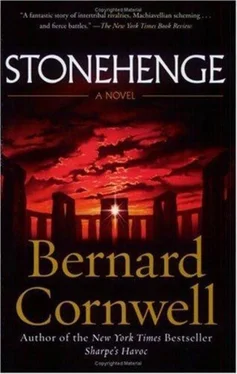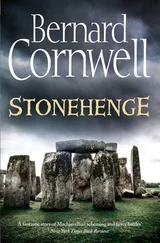1 ...7 8 9 11 12 13 ...111 The raven called again and Hirac looked up at the bird, wondering what its presence portended.
Camaban tucked the gold pieces back into his cheek, wet a finger and dabbed it into the powdered chalk of his soul. 'Slaol will be angry if you kill me,' he said to Hirac without stuttering, then he licked the chalk off his finger. He collected more, assembling his shattered spirit and eating it.
'Kill it!' Neel screamed.
'Kill it!' Hengall echoed.
'Kill it!' Lengar called.
'Kill it!' the crowd shouted.
But Hirac could not move. Camaban ate more chalk, then looked up at the priest. 'Slaol commands you to spare me,' he said very calmly, still without any stutter.
Hirac stepped back, almost into the grave, and let the Kill-Child fall. 'The goddess,' he announced hoarsely, 'has rejected the sacrifice.'
The crowd wailed. Saban, his eyes full of tears, was laughing.
And the crooked child went free.
There was fear in Ratharryn after the failed sacrifice for there were few omens worse than a god rejecting a gift. Hirac would not say why he had refused to kill the child, only that he had been given a sign, then he took himself to his hut where his wives claimed he was suffering from a fever, and two nights later those same wives wailed in the darkness because the high priest was dead. They blamed Camaban, saying the cripple had cursed Hirac, but Gilan, who was now Ratharryn's oldest priest, claimed that it had been a nonsense trying to kill a child marked with Lahanna's sign. Hirac had only himself to blame, Gilan said, for Hirac had woefully mistranslated the message of the gods. The gold had gone to the Old Temple and that was surely a sign that Slaol wanted the temple remade. Hengall listened to Gilan, who was a cheerful, efficient man, but distrusted because of his admiration for Cathallo. 'In Cathallo,' Gilan urged Hengall, 'they have one great temple for all the gods and it has served them well. We should do the same.'
'Temples cost treasure,' Hengall said gloomily.
'Ignore the gods,' Gilan retorted, 'and what will all the gold, bronze and amber in the world do for you?'
Gilan wanted to be high priest, but age alone would not give him that honour. A sign was needed from the gods and all the priests were seeking signs before, together, they would choose one of their number to succeed Hirac. Yet all the signs seemed bad for in the days following the failed sacrifice the warriors of Cathallo became ever bolder in their forays into Ratharryn's territory. Day after day Hen-gall heard of stolen cattle and pigs, and Lengar argued that the war drum should be sounded and a band of spearmen sent north to intercept the raiders, but Hengall still shied away from war. Instead of sending spears he sent Gilan to talk with Cathallo's rulers, though everyone knew that really meant talking to Sannas, the terrifying sorceress. Cathallo might have a chief, it might have great war-leaders, but Sannas ruled there, and many in Hengall's tribe feared that she had put some curse on Ratharryn. Why else had the sacrifice failed?
The omens became worse. A child drowned in the river, an otter tore apart a dozen fish-traps, a viper was seen in Arryn and Mai's temple, and Hengall's new wife miscarried. Grey bands of rain swept from the west. Gilan returned from Cathallo, spoke with Hengall, then walked north again; the tribe wondered what news the priest had brought and what answer Hengall had returned to Cathallo, but the chief said nothing and the folk of Ratharryn went on with their work. There were pots to be made, flints to be dug, hides to tan, pigs to herd, cattle to milk, water to fetch, buildings to repair, willow fish-traps to be woven and boats to be hacked out of the vast forest trees. A trading party arrived from the southern coast, their oxen laden with shellfish, salt and fine stone axes, and Hengall took his levy from the men before letting them travel north towards Cathallo. Hengall buried one of the axes in Slaol's temple and another in Lahanna's, but the gifts made no difference for the next day wolves came to the high pasture and took a heifer, three sheep and a dozen pigs.
Lengar alone seemed unaffected by the terrible omens. He had suffered the humiliation of yielding the gold to his father, but he retrieved his reputation by his prowess as a hunter. Day after day he and his companions brought back carcasses, tusks and hides. Lengar hung the tusks either side of his doorway as proofs that the gods smiled on him. Hengall, summoning the last shreds of his authority, had sternly ordered Lengar to stay out of the northern woods and thus avoid any confrontation with the spearmen of Cathallo, but one day Lengar came across some Outfolk in the south country and he brought back six enemy heads that he mounted on poles on the embankment's crest. Crows feasted on the grey-tattooed heads and, seeing the trophies on their skyline, more and more of the tribe was convinced that Lengar was favoured by the gods and that Hengall was doomed.
But then the Outfolk messengers came.
They arrived just as Hengall was dispensing justice, a thing that was done with each new moon when the chief, the high priest and the tribe's elders gathered in Arryn and Mai's temple and listened to wrangles about theft, threats, murder, infidelity and broken promises. They could condemn a man to death, though that was rare for they preferred to make a guilty man work for the wronged party. On that morning Hengall was frowning as he listened to a complaint that a field's boundary marker had been moved. The argument was passionate, but was broken off when Jegar, Lengar's friend, announced that Outfolk horsemen were coming from the west.
The Outlanders were blowing a ram's horn to proclaim that they travelled in peace and Hengall ordered Lengar to take a group of warriors to greet the strangers, but to allow them no nearer to Ratharryn than Slaol's temple. Hengall wanted time to consult with the priests and elders, and the priests wanted to don their finery. Food needed to be prepared, for though the Outfolk were regarded as enemies, these visitors came in peace and so would have to be fed.
The younger priests prepared a meeting place on the river bank just outside the settlement. They planted the skull pole in the turf, then splashed water to mark out a circle within which the visitors could sit, and outside that circle they placed ox-skulls, chalk axes and sprigs of holly to constrain whatever malevolence the Outfolk might have brought. The people of Ratharryn gathered excitedly outside the circle, for no one could remember any such thing ever happening before. Outfolk traders were common enough visitors, and there were plenty of Outfolk slaves in the settlement, but never before had Outfolk emissaries arrived and their coming promised to make a story to tell and retell in the long nights.
Hengall was at last ready. The tribe's best warriors were dispatched to escort the strangers to the meeting place while Gilan, who had just returned from his last mission to Cathallo, wove charms to prevent the strangers' magic doing harm. The Outfolk had their own sorcerer, a lame man whose hair was stiffened with red clay; he howled at Gilan and Gilan howled back, and then the lame man put a deer's rib between his naked legs, clamped it there for a heartbeat, then tossed it away to show that he was discarding his powers.
The lame sorcerer lay flat on the ground in the meeting place and thereafter did nothing except stare into the sky, while the other eight strangers squatted in a line to face Hengall and his tribal elders. The Outfolk had brought their own interpreter, a trader whom many of Ratharryn's folk knew and feared. He was called Haragg and he was a giant; a huge, brutal-faced man who travelled with his deaf-mute son who was even taller and more frightening. The son had not come with this embassy, and Haragg, who usually arrived at Ratharryn with fine stone axes and heavy bronze blades, had brought nothing but words, though his companions all carried heavy leather bags that Hengall's people looked at expectantly.
Читать дальше
Конец ознакомительного отрывка
Купить книгу












